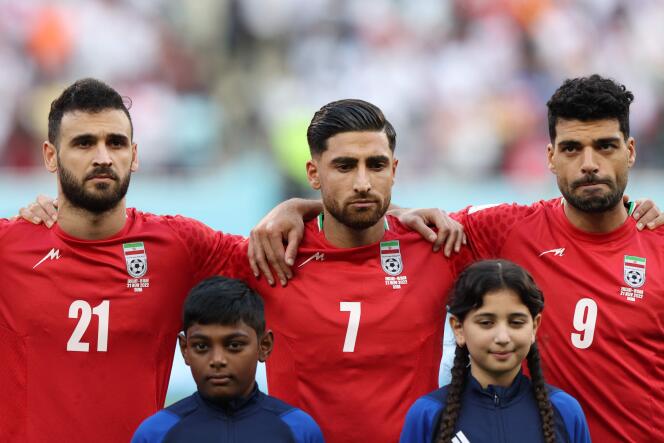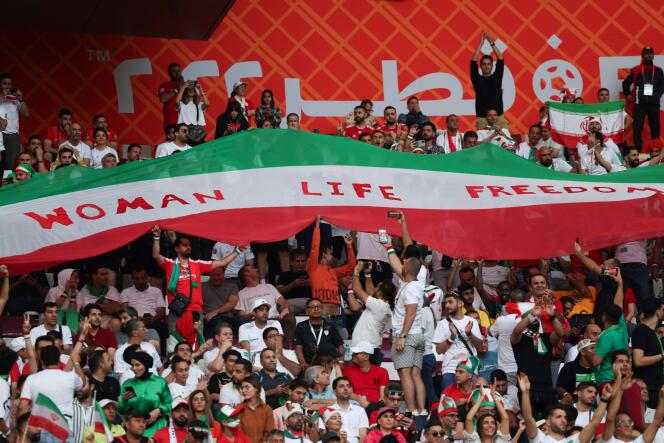
Never before has so much attention been focused on an Iranian team at a the outset of a World Cup. Not that anyone is betting on them to win in Qatar – in its six outings, Iran has never made it past the first round of the tournament.
Rather, it is the political situation in Iran – the protests for women's rights that have been violently repressed by the regime for almost three months – and its repercussions for the national team that are on everyone's lips. On November 12, the Iran Human Rights NGO estimated that at least 344 protesters had been killed and more than 15,000 arrested since the death on September 16 of Mahsa Amini, who was arrested by Tehran's morality police for apparently not respecting the regime's strict dress code.
On Monday, November 21, at the Khalifa International Stadium, the Iranian team faced England in the first match of group B. Iran suffered a heavy 6-2 loss, but it was their stance before the kick-off that made an impression: the starting 11 did not sing Sorude Melliye Jomhuriye Eslamiye Iran, the national anthem of the Islamic Republic of Iran – despite a clear warning from the Ayatollah Ali Khamenei that the team should not "disrespect" Iran.
Personal and collective choices
Prior to the game, team captain Alireza Jahanbakhsh explained that the players would decide "collectively" whether or not to sing the national anthem as a sign of support for the victims of the protests. Whether or not they would celebrate a goal during the World Cup would be a "personal" choice. When Medhi Taremi scored the team's two goals – one in the 65th minute and one in overtime – to the delight of the Iranian fans, the striker was modestly celebrated by his teammates.
Before the match, the majority of Iranian fans in the stands sang and applauded when the national anthem was played. But others protested and some booing was heard. One man wore a black T-shirt with the slogan "Rise with women of Iran," two others gave the finger toward the field and a large banner emblazoned with "Woman, Life, Freedom" was waved in the stands. This was to the displeasure of the team's Portuguese coach, Carlos Queiroz: "Fans who don't want to support the team can stay at home. We don't need them. They are not welcome."

Several fans interviewed around the stadium about the crisis in their country before kick-off declined to answer, claiming in perfect English to speak only Farsi. Ali, 51, who came from Tehran, said: "The majority of fans here today are from Iran. We are thinking only about the game, which we will win, God willing." When asked about the anti-regime demonstrations that took place during the Iran-USA match during the 1998 World Cup, he replied: "Qatar and Iran have good relations. They have solved this problem. People who enter cannot bring in any other flag than the Iranian one. No political message is allowed, it's FIFA's law."
Anoosh, 23, and her friend, 27, also made the trip from Tehran. The former wore an Iranian jersey, the latter an England jersey – both bearing the name of Ali Karimi, a great former Iranian player who took a stand against the Islamic regime. "We are from Tehran, but we don't like this Islamic team," said the young woman. "Today, we are here only to watch the game, we do not want to support our team. We will not celebrate if they score a goal or win."
'Let the kids play the game'
Sardar Azmoun, the team's star player, came in to play at the 76th minute of the game and hit the crossbar late in the game. He was hailed by every Iranian fan in the stadium, but even more warmly by the few who bore political signs. In the early days of the protest movement in late September, the striker immediately spoke out in defence of Iranian women. "My heart is truly broken for Mahsa Amini and those like her who died innocently. Their death has left a wound that history will never forget. I will always be your support," he wrote on his Instagram account. "You are my sisters."
In Iran, several illustrious former players boycotted the event, choosing to stay at home in solidarity with the protesters, including Ali Daei, the top scorer in the national team's history.
At the customary pre-game press conference on Sunday, player Ehsan Hajsafi was interviewed by the world's press. As a preamble, the defender read a short statement of support for oppressed Iranians: "They should know that we are with them. And we support them. And we sympathize with them regarding the conditions." At the end of the conference, a British journalist asked him about this statement. "We have to accept the conditions in our country are not right and our people are not happy," he continued. "We are here but it does not mean we should not be their voice or we should not respect them." Most of the Iranian media were in attendance, and none asked questions about the political situation in Iran.
After the game, as FIFA's president had on Saturday, team coach Queiroz pleaded for politics to be kept out of football: "Please, to the teachers, the moralists, let the kids play the game, play for the country. Of course, we have our opinions and we will express them in the right time."
The Iranians have two other games coming up in Doha, against Wales on November 25 and against the United States on November 29. The latter match will have strong diplomatic significance, 24 years after the previous clash between the two teams during the 1998 World Cup in France. And at the risk of displeasing their coach, it will be another opportunity for the players to make their voices heard, even if it's by remaining silent.